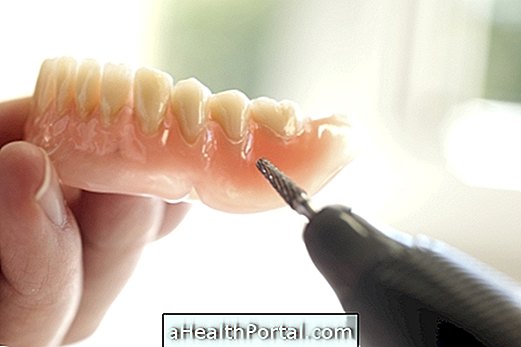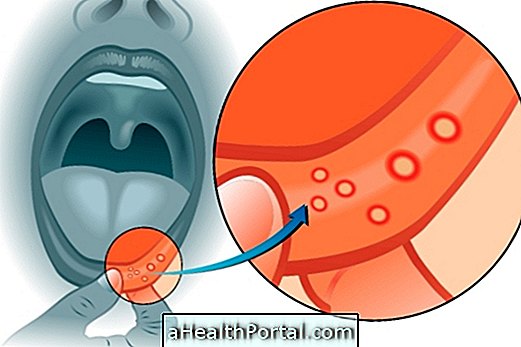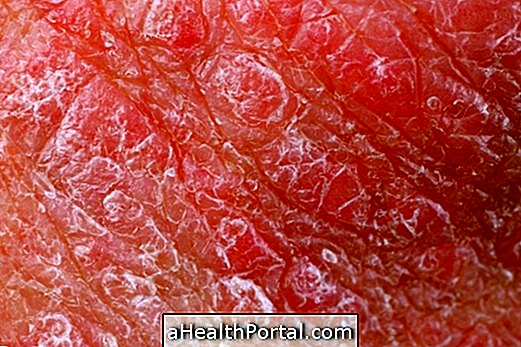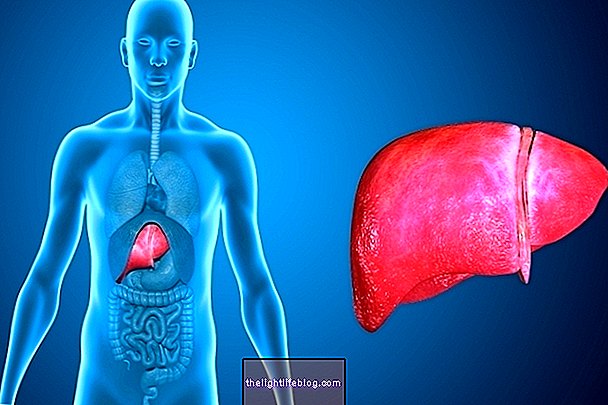The lump in the roof of the mouth when it doesn't hurt, grows, bleeds or increases in size does not represent anything serious, and may disappear spontaneously. However, if the lump does not disappear over time or there is bleeding, it is important to go to the doctor so that the diagnosis can be made and treatment started, as it may indicate oral cancer or pemphigus vulgaris, which is an autoimmune severe immune system that, if left untreated, can be fatal.

The main causes of lump in the roof of the mouth are:
1. Mouth cancer
Mouth cancer is the most common cause of lumps in the roof of the mouth. In addition to the presence of lumps in the sky in the mouth, mouth cancer is characterized by the presence of sores and red spots in the mouth that do not heal, sore throat, difficulty speaking and chewing, bad breath and sudden weight loss. Learn how to identify mouth cancer.
Mouth cancer is more common in men over 45 and who often drink and smoke excessively, use prostheses that are poorly placed or that perform oral hygiene incorrectly. This type of cancer does not usually hurt in the initial phase, but if it is not identified and treated quickly, it can be fatal.
What to do: In the presence of signs and symptoms of oral cancer, it is important to go to the dentist so that you can have a mouth exam and thus make the diagnosis. Treatment for oral cancer is done by removing the tumor and then chemo or radiation therapy sessions. See some treatment options for mouth cancer.
2. Palatine torus
The palatine torus corresponds to bone growth in the roof of the mouth. The bone grows symmetrically, forming a lump whose size varies throughout life and usually does not represent anything serious, however, if it disturbs the bite or chewing it must be removed by the dentist.
What to do: If a hard lump is found in the roof of the mouth, it is important to go to the doctor to make the diagnosis and indicate whether or not there is a need for surgical removal.
3. Canker sores
The lump in the roof of the mouth can also be indicative of cold sore, which can cause pain, discomfort and difficulty eating and talking. Canker sores are usually small, whitish and usually disappear after a few days.
Canker sores can arise due to various situations, such as stress, autoimmune disease, pH change in the mouth and vitamin deficiency, for example. Know other causes of cold sore.
What to do: Usually, thrush disappears spontaneously, however, if it is causing discomfort or does not disappear, it is important to go to the dentist so that the best way to eliminate the thrush can be indicated. In addition, mouthwashes can be made with warm water and salt 3 times a day or suck on ice, as it helps to relieve pain and inflammation. It is also important to avoid the consumption of very acidic foods, such as kiwi, tomatoes or pineapples, for example, as they can cause more inflammation and, consequently, more discomfort. Find out how to get rid of cold sore permanently.

4. Mucocele
Mucocele is a benign disorder characterized by obstruction of the salivary glands or a blow to the mouth leading to the formation of a bubble in the roof of the mouth, lip, tongue or cheek. Mucocele is not serious and usually does not cause pain, unless there is another associated injury. Understand more about the mucocele and how to treat it.
What to do: The lump usually disappears in a few days, and treatment is not necessary. However, when it grows too much or does not disappear, it is important to go to the dentist so that it can be removed using a small surgical procedure to remove the salivary gland and decrease the swelling.
5. Pemphigus vulgaris
Pemphigus vulgaris is an autoimmune disease characterized by the presence of blisters in the mouth that usually cause pain and, when disappeared, leave dark spots that remain for several months. These blisters can easily spread to other parts of the body, bursting and leading to ulcers. See how to identify and treat pemphigus.
What to do: Pemphigus is a serious disease and needs to be treated, so when the first signs of the disease appear it is important to seek medical help so that treatment can be started, which is usually done with the use of corticosteroids, immunosuppressants or antibiotics.
When to go to the doctor
It is important to go to the doctor when:
- The lump does not disappear spontaneously after a while;
- More lumps, sores or stains appear in the mouth;
- There is bleeding and pain;
- The lump increases;
In addition, if it is difficult to chew, speak or swallow, it is important to consult a dentist or general practitioner so that the diagnosis and treatment can be started, thus avoiding future complications and more serious illnesses, such as cancer. mouth.
Was this information helpful?
Yes No
Your opinion is important! Write here how we can improve our text:
Any questions? Click here to be answered.
Email in which you want to receive a reply:
Check the confirmation email we sent you.
Your name:
Reason for visit:
--- Choose your reason --- DiseaseLive betterHelp another personGain knowledge
Are you a health professional?
NoMedicalPharmaceuticalsNurseNutritionistBiomedicalPhysiotherapistBeauticianOther























